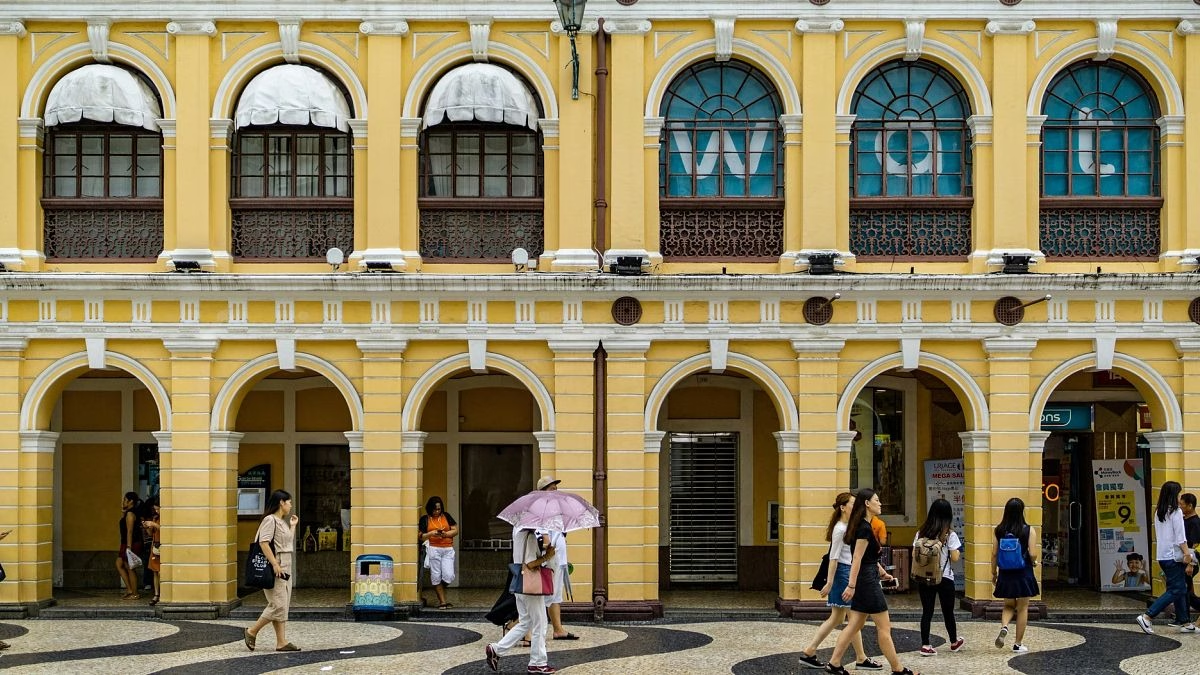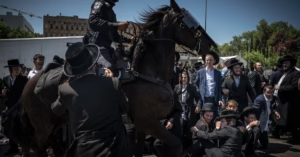Chronicles: Churches and culinary traditions that date back centuries bear witness to the enduring influence of Portugal on the landscape of Macao as this region continues its integration with China.
<
div style=”–widget_related_list_trans: ‘Related’;”>
The Lilu Square exudes warmth and tranquility in the declining light.
Paced after the Portuguese tradition, time moves leisurely here. Citizens enjoy coffee while engaging in conversation by a kiosk. Travellers capture moments in front of buildings whitened by lime and appreciate the ‘calçada’, the smoothly undulating tiles marking the places touched by the Portuguese footsteps.
Were it not for the bicentennial banyan tree and the melodious ebb and flow of Cantonese in the air, you might mistake this corner of Macao for a tranquil Lisbon suburb.
Observing a fountain that sprays water into a shallow basin, I reflect on an old saying about this place: anyone who drinks from its water will one day return to Macao.
Although I am uncertain if I have consciously tasted water from the fountain, this marks my sixth journey to the city, each trip slightly longer than the last. With each visit, I am drawn deeper into the extraordinary cultural tapestry, constantly uncovering something novel about Macao’s Portuguese past and enchanting myself all over again.
There may be truth to the legend after all.
Macao is more than its casino scene
Speak of Macao, and most would think of casinos—even though the city has almost €25 billion in gaming revenue, much of which comes from the baccarat games favored by gamblers from the mainland.
Before becoming Asia’s casino hub, Macao was a critical outpost of Portugal’s global empire.
Enticed by its location in the Pearl River Delta, the Portuguese arrived in the 16th century, establishing Macao as an essential trading post.
Macao’s prosperity waxed and waned over the centuries; by the 1990s, it was a city of vices, dominated by Stanley Ho—referred to as ‘the godfather of gambling’—and his casino monopoly.
After more than four centuries of colonial rule, Portugal transferred Macao to China in 1999. Beijing quickly began to reshape the city, reclaiming land to merge the islands of Taipa and Coloane, creating the Cotai Strip known for its luxury casino-resorts.
The once-impoverished territory rapidly morphed into one of the wealthiest places in the world.
Whispers of Portugal survive in old Macao
On a perfect January morning, under a soft sun illuminated by a clear blue sky, I meet Mariana César de Sá to embark on an exploration of Macao’s UNESCO-listed historical center.
Born and raised in Macao, César de Sá publishes ‘Macao News’, the city’s leading English-language news and lifestyle source. She takes satisfaction in showing visitors the city beyond the sprawling casino-resorts.
We meet behind Macao’s most recognizable landmark, the Ruins of St. Paul’s. Only the stone facade of this church, lost to a centuries-old blaze, remains.
Before facing the crowds gathered before the cathedral-like frame that overlooks old Macao as a gateway to the past, we enter the Pátio do Espinho—Once a refuge for exiled Japanese Christians who erected the church, today it’s a quiet enclave of one-story homes.
“I like to bring visitors here first. It’s steeped in history but presents a slice of authentic life,” de Sá informs me.
It’s also a reminder of the Portuguese era of Discovery—how their customs, architecture, and religion were rooted in the world’s farthest corners.
Discover the rich tapestry of Macao on a historical walk
From the ruins, we idle along the cobblestoned Travessa da Paixão, ‘passion street’—lined with pastel-hued colonial buildings transformed into a popular backdrop for wedding photography. We saunter through narrow lanes to reach Senado Square.
Upon arriving at the plaza, the city’s civic center paved with calçada since the 16th century, de Sá directs my attention towards a grand white structure: the Municipal Affairs Bureau.
“It was the original city hall from the 18th century—and still serves as one today—but most people don’t realize visitors can enter it,” she notes, stepping into a serene Portuguese courtyard adorned with blue and white azulejos (ceramic tiles) depicting scenes from Macao’s past.
The entire historic area brims with secret nooks and centuries-old edifices that continue to function today. The canary-yellow St. Lawrence Church built by Jesuits still holds services, while the coral-hued Macau Military Club, once exclusive to military men, now invites guests to its esteemed Portuguese restaurant.
Certain places, like the Dom Pedro V Theatre—a vestige from the 19th century—hold special significance beyond their historical context.
“It instantly transports me to Portugal,” says Sara Santos Silva, an expat from Porto residing in Macao for the past decade.
“In my initial days here, amid the sensory overload of Asia, it was comforting to find familiar surroundings: impeccably laid cobblestones, a kiosk reminiscent of Lisbon’s, and the pale-green front of the theatre.”
Even the venerable A-Ma Temple, a venerable shrine dedicated to the Chinese sea goddess Mazu, holds unexpected importance. The Portuguese settlers misunderstood the temple’s name ‘A-ma-gok’ as the land’s name itself upon their arrival centuries ago.
Macao’s Portuguese heritage is best enjoyed through its food
Perhaps nothing encapsulates this unique cultural blend like Macao’s culinary offerings.
From serene Coloane and residential Taipa to the historic center, time-honored restaurants serve up Portuguese classics such as ‘bacalhau à brás’ (a salted cod dish), grilled sardines, and duck rice.
“There’s no lack of options. I know where to go for a commendable ‘francesinha’ (Porto’s robust sandwich), a proper ‘prego’ (grilled steak sandwich), and Portuguese monkfish rice that instantly feels like home,” says Silva. “It’s not a one-stop discovery, however.”
In the picturesque St. Lazarus district, a group of restaurants led by restaurant group Albergue 1601 devoted to Portuguese food and wine have been newly established.
Pedro, Ricardo, and Asai have taken old structures and transformed them into landmarks for Portuguese cuisine and wine. Their most renowned project, Albergue 1601, serves grilled octopus, seafood stew, and grilled Ibério pork in a historic yellow house wrapped by centuries-old camphor trees.
However, their latest venture offers a modern reflection of Portugal.
The Portuguese legacy is being redefined through Macao’s cuisine
I encounter Pedro, Ricardo, and Asai at 3 Sardines on a peaceful weeknight. As we sample ‘petiscos’—an array of small dishes comparable to tapas—like ‘pica-pau’ (beef cubes with pickles) and fried peppers, I admire the wall adorned with magazine cutouts and fishing nets hanging from the roof. When I caress the soft red cushions I am seated on, Ricardo reads my thoughts.
“These are real executive seats from TAP planes from the 1950s,” he reveals. “Every item you see is a vintage piece hand-chosen from Portugal.”
Asai fell in love with Portuguese culture—its cuisine, in particular—upon arriving in Macao and made it his mission to revive its presence. The group currently runs four restaurants, a workshop space, and a pastry shop—each a devoted homage to Portugal.
These establishments not only infuse new life into the previously overlooked St. Lazarus district but also enhance its timeless institutions and the subtle idiosyncrasies of life that maintain a four-century-old connection vibrant.
“Most visitors are taken aback by how present this heritage remains in Macao,” Silva remarks.
“Street names are in Portuguese. Locals occasionally pepper their daily conversation with Portuguese phrases. This not only immerses travelers in the legacy but also provides Portuguese residents with a sense of belonging that is truly difficult to rival.”





